Edna & Family Photos
As I've worked on the book, questions and curiosity led us to dig for old photos. And a recently uncovered box from my mom's aunt's house surfaced a treasure trove of old photos—including many of Edna and family. I plan (hope) to publish the book next year. It's currently in a few novel contests and so far has received very positive reviews. In the meantime ...

Edna when she was teaching high school in Aberdeen, Washington, in the early 1920s.
Excerpt from Part II:
“I taught here in Padilla for a brief time at first, right out of college. I taught the little children. Then I taught over in Wilbur for a couple of years.”
“Oh, that’s right!” Deb said with a big grin. “Such a small town. Karen’s husband grew up there. Such a coincidence.”
“Oh, yes. That’s right. I do remember the Kunz family.” Edna nodded and said, “Mm-hmm. Wilbur. My, that was an adventure. So far east, you know, out in the wheat fields. The farms there are immense. It would take days to walk across one! Karen’s husband did good getting out of that place!” She laughed. “Teaching high school down in Aberdeen for a few year after that was a nice change. From wheat fields to the ocean! It was almost a culture shock. But oh, when I got the opportunity to move to Seattle in 1926 … Well, that was something to get excited about. And so much easier to come home more often on the train. Once I got there, I knew I wanted to stay put for a while. So I bought that house on 12th Avenue. Sometimes, I had roommates to share the costs. Sometimes, I lived alone. I had some very dear friends among the other teachers. It’s been a good balance for me—the farm years, then the city years, and now back to the farm years.”
“You were glad to finally come home?”
“Oh, of course. Padilla Bay has always had my heart. I always intended to come back. That’s why the boys and I built this house in the late forties. We wanted Mother and Father to have a more comfortable, more modern place. But we also wanted something new for ourselves that needed less upkeep. And was less drafty.”
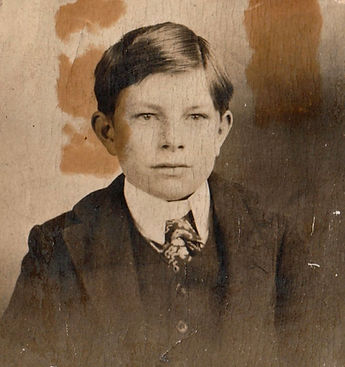
Marcellus Breazeale. About 1900.
Excerpt from Part I:
Marcellus had a crooked smile and light hair. His eyes disappeared when he laughed, and he normally found a lot to laugh about. He was funny and a gentleman, but there was just a hint of the devil in him. All the girls in town—the married ones and the unmarried ones—were in love with him. But he’d loved only Hazel. And Edna, for her part, adored him. For the first time that day, she realized that she’d be far away from him when she was at school for months on end. She’d miss his jokes and the way he so easily managed their parents.

Edna and me. Mid-1980s.
Excerpt from Part II:
But at this moment, as Debbie and Edna sat on the couch and faced the fireplace with their feet on a round, colorful rag rug, they were alone. On the mantel, an oversized black-and-white photo of an elderly Fred stared down his long nose at them.
At eighty-two, Edna was still getting used to living alone. She loved it when Debbie and her family came to visit her. Although she was never bored or lonely—and never without a chore—Edna always appreciated company and a good, long chat. She also loved having young energy and hearing young voices in this house.
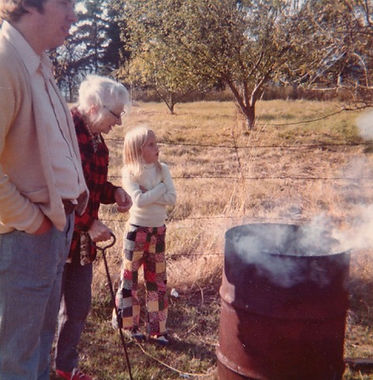
My dad Larry, Edna, and me on the farm.
About 1975.
Excerpt from Part I:
As she looked out on the bay below her, a bright yellow flower that was growing along the roadside caught her eye. Edna stopped.
“Tansy,” she muttered with disgust.
Her father had warned her about these weeds, and he’d pointed them out to her when they’d seen them. Tansy was poisonous to animals, and he’d told her the saddest story about a man he knew whose beautiful gray saddlehorse had died after grazing along the road up in Edison. John Henry had encouraged her and the boys to pull tansy out by the root any time they saw it. So Edna tromped into the grasses and plants along the road, wrapped one hand around the flower’s green stems, and pulled the whole thing up. Clumps of dirt fell to the ground from the root ball as she shook the wad of greenery.
The little flowers smiled up at her happily, but she was hardhearted. The thought of that gray horse suffering made her want to cry. Now she looked around her. What was she going to do with a handful of tansy? She didn’t want to drop it, as local animals could still get ahold of it. She shook it again, more forcefully, to knock more dirt off. Then she decided she’d have to just take it home and dispose of it sensibly. Her father kept a burlap bag that he used for collecting tansy. Whenever he had a burn pile, he’d throw his collection on and smugly watch it be incinerated. So she wrapped her hands around the rapidly weakening stems and headed back to the road to continue her walk home.

My sister Laura and me, heading to the old Doc McHenry house, just south of Edna's house. About 1975.
Excerpt from Part II:
“Fred and Marcellus used $700 in gold that they’d mined to buy some of this property from Doc McHenry. He left the rest of the land to the boys in his will when he died in 1943. Then we sold our old place when we finished this house in 1949.”
Edna thought about the old bachelor who’d been their neighbor and friend. “I’ve told you about him, of course. He lived in the old house down in the orchard—the one that fell down three years ago.”
“That house was so interesting,” Debbie said. “I remember exploring it with Marcellus when I was a kid.”
“I watched it lean farther and farther over the years until it collapsed,” Edna told her. “I do believe that Doc built it.”
“Was he a doctor?” Debbie asked.
Edna laughed. “Oh, no, he wasn’t. He did many things for money. I believe he helped outfit miners and loggers with food and supplies. He also shoed the oxen that were used to log Bay View Ridge. But he wasn’t much of a farmer. Oh, the boys worked so hard clearing the stumps on this property! You’ll find the rock piles they created up the hill and behind the woods.”
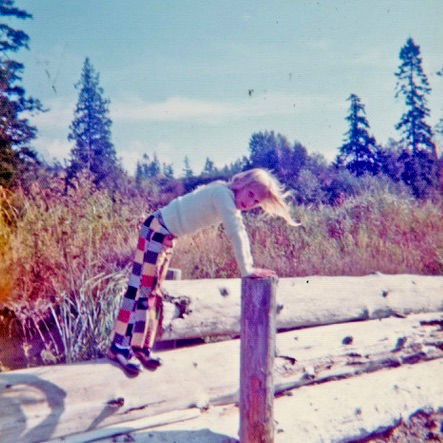
Me again, on the beach. About 1975.
Excerpt from Part III:
As the sisters began the slightly sloped path down to the bank, they took in the series of red-railed steps and the tunnel in front of them.
“Look at us, walking right under Bayview Edison Road!” Kristy said as she headed down the stairs. “Wild.”
“This was a smart solution,” Sam said, looking around and then up at the road above.
The air turned cooler as they entered the short tunnel, and the concrete-clad earth around them blocked the sounds and light of the world outside.
“I don’t remember the last time I was at this beach,” Sam said, her voice echoing in layers over the sound of their footsteps.
“Me either,” Kristy replied, her words echoing back. “I do remember coming down here with Edna. I know there’s a photo of me taken on the beach in the seventies. I’m pretty sure I’m wearing some sweet-ass plaid bell-bottoms.”
As they exited the west end of the tunnel, the concrete gave way to a wooden ramp and a gateway of greenery. A cool beach breeze met them, and the world opened back up—blue sky and blue bay spreading straight up, and to the north and the south.
The women walked under an arch displaying images and information about the bay, the estuary, and the wildlife. On the other side of it was a small observation deck surrounded by red steel railings. The women leaned side by side against the railing and looked down at the beach below. The breeze stirred the leaves above and around them, then ruffled their hair.
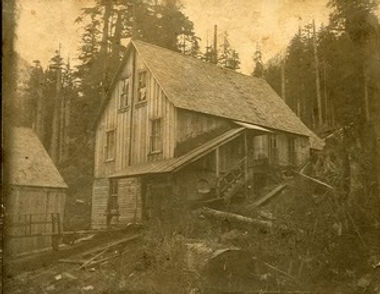
The Breazeale home in Monte Cristo, pre-1897.
Excerpt from Part I:
Her parents had struggled to buy the farm. John Henry had worked on railroads and in logging camps to earn money. He’d also abused his body, laboring in mines all over the West before finally moving his family across the country from Missouri to join his brother Bill and his family. After finding work in the gold and silver mines in Monte Cristo, Washington, John Henry had moved Anna, Fred, Marcellus, and Edna into the steep mountain mining town, where they felt like they always had to lean to stay upright when they walked. While there, he’d run the mine’s concentrator, which separated minerals from ore. Meanwhile, his young family had lived in a small house that clung to the mountainside, surrounded by jagged peaks.
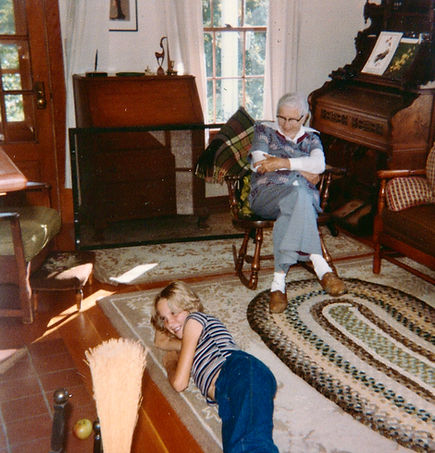
Edna and me, about 1980.
Excerpt from Part II:
She remembered her own mother’s skirts and petticoats. The laced-up shoes and complicated hats and tins of face powder—even when she had small children to chase and raise. Edna thought about the uncompensated hard labor Anna had performed for decades. The loss and the sacrifice. The subtle maneuvering she’d had to perfect to get her needs met. Nothing had been straightforward for her mother. As kind as John Henry had been, Anna Breazeale had been tied down by the laws, fashions, and financial dependence of her era. Years of reflection had given Edna a new perspective on Anna, along with a new appreciation for the freedom she’d fought to give her daughter. Now Edna looked at Cousin Russell’s youngest and thought about the freedoms she enjoyed without having to fight for them. She couldn’t imagine what lay in store for Debbie’s three little girls.
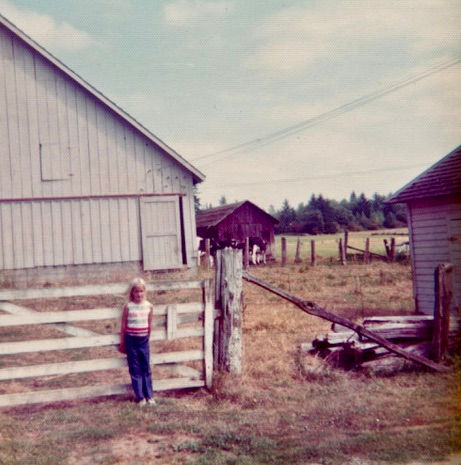
Me in the barnyard. About 1975.
Excerpt from Part III:
“I came up for a dinner auction right before the pandemic,” Kristy said. “The barn was all lit up with party lights. It was nuts. I texted Dad photos. It was so much fun.”
Kristy pointed toward the barn, remembering the summer night when a few members of the Breazeale family had come together to attend the auction in a group. Then she laughed. “Aunt Barbara, Walter, Heidi, and I wandered down to the house to walk around the outside, and Mom’s cousin Jodene discovered that the back door was unlocked. She snuck inside and used peer pressure to make us follow her.”
Kristy covered her eyes with one hand. “God! I couldn’t believe she did that.” She removed her hand and sighed. “But I went in anyway. So there we were, standing around the living room, reminiscing, when some guy who worked here walked in to use the copy machine!”
Sam laughed. “I remember hearing about that,” she said as she bit into a piece of pineapple.
“I felt like we were a gang of delinquents, breaking and entering.”
“You could never take the pressure of breaking rules. You’d make a terrible, terrible thief,” Sam said.
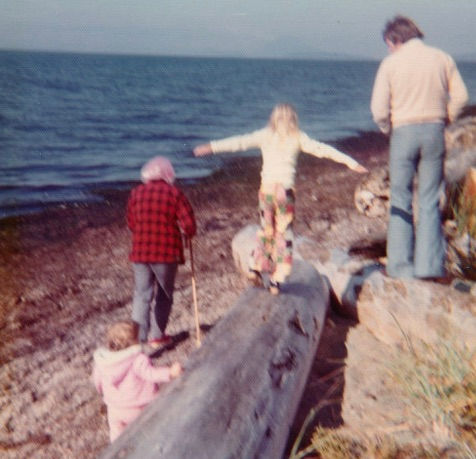
Laura, my dad, and me with Edna on the beach. Circa 1975.
Excerpt from Part I:
Scattered white clouds streaked above the islands, sending shadows gliding over trees and the water. She liked to imagine those clouds starting their journey in Alaska, then finding their way into Puget Sound like the ships that came pouring in with goods from California and the Far East.
Everywhere she looked above her and beyond, there was something interesting to see and think about.
But the world below her feet was just as fascinating. Air bubbles popped messily in the black mud, and she’d tried to picture the clams and geoducks buried deep below the surface. Sometimes, her mother sent her and her brothers down with pails and stubby shovels to dig in the sand and bring home clams for dinner. Once, when they were much younger, Marcellus, covered in mud and grinning with glee, had chased Edna with a geoduck he’d hauled up. It was monstrous and strange, and she’d laughed and shrieked as she ran, kicking up sand and salt water behind her. But when she’d finally stopped and looked at the giant thing, she thought it was amazing.
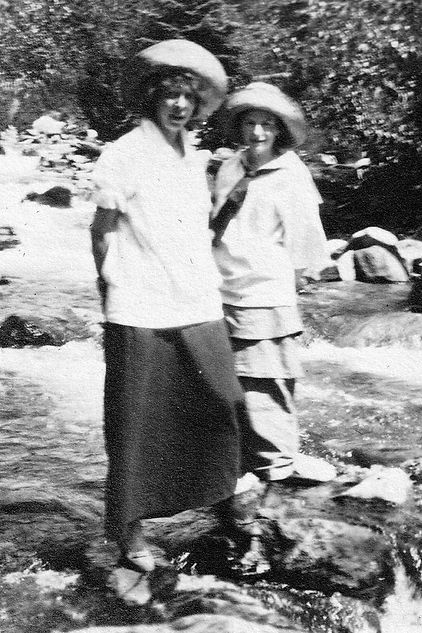
Edna (right) with her cousin Will's wife Ethel.
Sometime in the 1920s
Excerpt from Part I:
Her cousin Will’s son had been born that spring on the other side of Puget Sound, in a little beachside town called Olalla. Edna had never been there, but she knew of the Mosquito Fleet, a collection of boats that ferried people all over the Sound. In fact, she’d heard that Will and Ethel met when Will was getting off the steamer the Virginia V in Olalla. She hoped it wouldn’t be hard for them to come to Seattle for a day or two—especially if the weather was fine.
Edna liked charming Will, with his quick wit and easy manner. They’d been born only a few months apart, and she’d always been drawn to him. The only boy in his family to survive childhood, Will had been hopelessly spoiled by his parents and older sisters—to the point where he moved through life with limitless confidence in himself and buoyant expectations of success and acceptance. Ethel, whose warm smile lit up a room, was so tall that she’d had to bend over slightly to talk to Edna each time they met. She was fun and daring in her humor, which Edna secretly enjoyed—even if Anna called it cheeky.
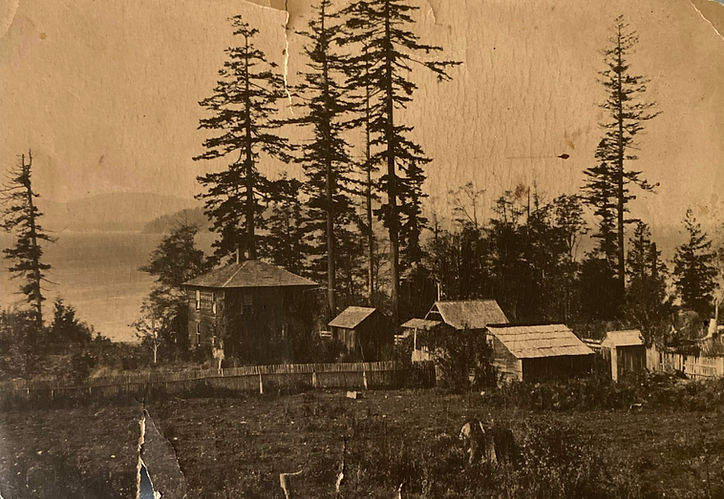
The original Breazeale farm, north of the present-day house and barn.
Excerpt from Part I:
She sighed, thinking of the domestic world her formidable mother ruled. It consisted of the inside of the farmhouse—the two-story gray clapboard with a bay window and a chimney that leaned drunkenly to one side.
Edna pictured her mother, on her feet all day in the kitchen, surrounded by four walls and covered by a roof, trying to capture every drop of harvest. And her tireless service to the men. Even though there was almost no end to the work that only the men could do, Edna felt there was even more work that no one but Anna was willing to do.
Anna did manage to find time to read and play the family pump organ some evenings and the occasional Sunday. But Edna wondered if her mother ever walked outside to turn her face to the sun, or feel mist drift down onto her eyelashes, or let the wind play with her hair.